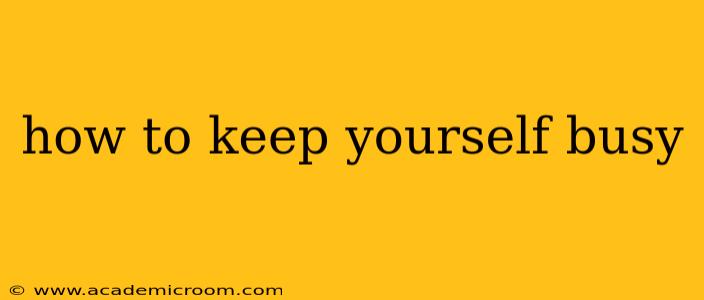How to Keep Yourself Busy: Finding Purpose and Productivity in Your Free Time
Feeling bored? Unsure how to fill your free time productively and enjoyably? Many people struggle to find fulfilling activities when they have downtime. This comprehensive guide will help you discover ways to keep yourself busy, focusing on activities that enrich your life and prevent boredom from taking hold. We'll explore various options, considering different interests and lifestyles.
What are some good ways to keep busy at home?
Staying busy at home doesn't require expensive outings or elaborate plans. Simple, enjoyable activities can transform your downtime into productive and fulfilling experiences. Here are some ideas:
- Learn a New Skill: From coding to calligraphy, cooking to crocheting, the internet provides countless free tutorials and resources. Learning a new skill not only keeps you occupied but also expands your capabilities and boosts your self-esteem.
- Embrace Creative Pursuits: Unleash your inner artist through painting, drawing, writing, playing a musical instrument, or even crafting. These activities offer a creative outlet and a sense of accomplishment.
- Organize and Declutter: Tackling that overflowing closet or cluttered garage can be surprisingly satisfying. Organizing your space creates a more calming and productive environment.
- Read a Book or Listen to a Podcast: Immerse yourself in captivating stories or insightful discussions. Reading and listening are excellent ways to relax, learn, and expand your knowledge.
- Start a Home Improvement Project: Whether it's repainting a room or assembling some furniture, home improvement projects offer a tangible sense of accomplishment.
- Engage in Mindfulness Practices: Meditation, yoga, and deep breathing exercises can help reduce stress and improve focus. These practices promote mental well-being and provide a sense of calm amidst a busy life.
What can I do to keep myself busy when bored at work?
Boredom at work can significantly impact productivity and morale. It's crucial to find productive and acceptable ways to keep yourself occupied during downtime.
- Tackle Small Tasks: Review your to-do list and address any small tasks that have been lingering. This ensures you stay productive and reduces your overall workload.
- Organize Your Workspace: A clean and organized workspace enhances productivity and focus. Spend some time tidying up your desk and files.
- Network with Colleagues: Engage in professional conversations with colleagues to build relationships and share knowledge.
- Take a Short Break: Step away from your desk for a few minutes to stretch, walk around, or grab a drink. Short breaks can improve focus and prevent burnout.
- Engage in Professional Development: Utilize downtime to read industry articles, listen to podcasts, or take online courses related to your field. This enhances your skills and keeps you current.
How do I keep myself busy without technology?
Disconnecting from technology is crucial for mental well-being and can foster creativity. Here are some engaging activities that don't require screens:
- Spend Time Outdoors: Go for a walk, hike, bike ride, or simply relax in a park. Nature offers a refreshing break from technology and provides opportunities for exercise and relaxation.
- Engage in Hobbies: Pursue hobbies that don't involve screens, such as knitting, gardening, painting, or playing board games.
- Socialize with Friends and Family: Spend quality time with loved ones, playing games, having meaningful conversations, or simply enjoying each other's company.
- Volunteer: Giving back to your community is a rewarding experience that keeps you busy and connected.
- Learn a New Language: Use physical language learning resources, such as textbooks or workbooks, to improve your language skills.
How can I stay busy without feeling overwhelmed?
The key is to find a balance and choose activities that you genuinely enjoy. Avoid over-scheduling yourself and build in time for relaxation and downtime.
- Prioritize Tasks: Focus on the most important tasks first, and break down larger projects into smaller, manageable steps.
- Set Realistic Goals: Don't try to do too much at once. Set achievable goals and celebrate your accomplishments along the way.
- Take Breaks: Regular breaks are crucial for preventing burnout and maintaining productivity. Step away from your work or activities to rest and recharge.
- Practice Self-Care: Prioritize activities that promote your physical and mental well-being, such as exercise, healthy eating, and sufficient sleep.
By thoughtfully choosing activities that align with your interests and values, you can effectively manage your free time, prevent boredom, and enhance your overall well-being. Remember to prioritize self-care and avoid over-scheduling to maintain a healthy balance. Keeping busy should be enriching, not exhausting!
